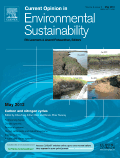
Current Opinion in Environmental Sustainability
Scope & Guideline
Navigating the Frontiers of Sustainability Research
Introduction
Aims and Scopes
- Governance and Policy Frameworks:
The journal explores various governance structures and policy frameworks that facilitate sustainable practices and address environmental challenges at local, national, and global levels. - Climate Change Adaptation and Resilience:
A significant focus is placed on understanding the mechanisms and strategies necessary for adapting to climate change, including resilience-building in vulnerable communities and ecosystems. - Sustainable Food Systems and Agriculture:
Research often revolves around sustainable practices in agriculture and food systems, examining how innovation, biodiversity, and community engagement can enhance food security and sustainability. - Biodiversity and Ecosystem Services:
The journal addresses the importance of biodiversity and ecosystem services in sustainability, highlighting the need for conservation and management strategies that balance human needs with ecological integrity. - Financial Mechanisms for Sustainability:
Exploration of financial instruments and mechanisms, such as green finance and sustainability reporting, that support environmental sustainability and drive investment towards sustainable projects. - Interdisciplinary Approaches to Sustainability:
The journal promotes interdisciplinary research that integrates diverse knowledge systems, including indigenous knowledge, to address complex sustainability challenges.
Trending and Emerging
- Transformative Governance Models:
There is a growing interest in governance models that facilitate transformative change towards sustainability, emphasizing participatory approaches and multi-stakeholder engagement. - Interconnections between Peace and Sustainability:
Research increasingly explores the links between peacebuilding, conflict resolution, and sustainability, acknowledging that environmental degradation can exacerbate conflicts and vice versa. - Climate Finance Innovations:
A surge in discussions about innovative financial instruments and frameworks aimed at supporting climate-resilient development reflects the urgent need for sustainable funding solutions. - Social Dimensions of Climate Adaptation:
Emerging research highlights the importance of social equity and justice in climate adaptation strategies, focusing on marginalized communities and their unique vulnerabilities. - Biodiversity and Human Well-being:
There is an increasing recognition of the intrinsic link between biodiversity conservation and human well-being, leading to studies that advocate for integrated approaches to ecosystem management. - Complex Systems and Resilience Thinking:
An emphasis on systems thinking and complexity within environmental sciences is becoming more prominent, with a focus on resilience and adaptive management in various contexts.
Declining or Waning
- Genetic Modification in Agriculture:
Research related to genetically modified organisms (GMOs) and their role in addressing climate change has diminished, possibly due to increasing scrutiny and preference for organic and traditional agricultural practices. - Technological Solutions without Human Context:
There seems to be a waning emphasis on purely technological solutions for sustainability, as the journal increasingly recognizes the importance of social dimensions and community engagement in implementing effective solutions. - Traditional Economic Models:
Discussions focused purely on conventional economic models without consideration for ecological and social factors are becoming less prominent, as more holistic approaches gain traction. - Narrowly Defined Environmental Metrics:
The use of narrow or overly technical environmental metrics is declining, with a shift towards broader, more inclusive measures that consider social equity and justice. - Overemphasis on Urban Sustainability:
While urban sustainability remains important, there is a noticeable decline in studies focused solely on urban environments, as the journal increasingly highlights rural and indigenous perspectives in sustainability discussions.
Similar Journals

Frontiers in Sustainable Cities
Transforming Urban Landscapes through Innovative ScholarshipFrontiers in Sustainable Cities, published by FRONTIERS MEDIA SA, is an esteemed academic journal dedicated to advancing the fields of Urban Studies, Renewable Energy, and Public Administration. With a commitment to open access since 2019, the journal facilitates the dissemination of high-quality research aimed at creating sustainable urban environments. Operating from Lausanne, Switzerland, this influential publication supports knowledge exchange among researchers, professionals, and students involved in the complex dynamics of urban sustainability. The journal has achieved notable recognition, reflected in its quartile rankings—Q1 in Urban Studies and Q2 in both Public Administration and Renewable Energy, Sustainability and the Environment—indicating its relevance and impact within the scholarly community. Researchers benefit from a broad reach through its open access policy, enhancing visibility and accessibility of important findings that contribute to the development of sustainable cities globally.

Facets
Exploring the Dimensions of Scientific InquiryFacets is a prominent open-access journal published by Canadian Science Publishing, dedicated to the multidimensional exploration of scientific knowledge across various disciplines. With an ISSN of 2371-1671, this journal has established itself as a vital resource for researchers, professionals, and students alike since its transition to open access in 2016. Based in Ottawa, Canada, Facets enjoys a remarkable reputation, evidenced by its ranking in the top quartile (Q1) of multidisciplinary journals as of 2023, and its impressive Scopus ranking as #24 out of 171, positioning it in the 86th percentile. The journal aims to facilitate innovative research and foster collaborations by providing a platform for cutting-edge studies that address complex, interdisciplinary challenges. The focus on a broad scope ensures that diverse perspectives contribute to the ongoing conversation in the scientific community, making Facets an essential point of reference for those seeking to stay at the forefront of scientific research.

Green Finance
Transforming financial models for a sustainable future.Green Finance, published by the American Institute of Mathematical Sciences (AIMS), is a leading Open Access journal dedicated to the intersection of financial theory and environmental sustainability. Since its inception in 2019, it has played a crucial role in advancing scholarly research in the field of green economics, providing a platform for innovative studies that address the challenges and opportunities of integrating ecological considerations into financial models. With impressive rankings, including a 97th percentile in the Economics, Econometrics, and Finance category, and a notable impact on finance and econometrics, this journal is essential for researchers, professionals, and students who aim to contribute to sustainable financial practices. Its commitment to accessibility ensures that research output is available to a global audience, fostering collaboration and knowledge exchange. Join the conversation in this vital area and explore groundbreaking research that shapes the future of financial sustainability.

ECOLOGY AND SOCIETY
Innovating solutions for pressing environmental challenges.ECOLOGY AND SOCIETY, published by the esteemed Resilience Alliance, stands as a paramount open-access journal in the field of ecology, having served the academic community since its establishment in 1997. With an impressive Q1 ranking in Ecology and an Scopus rank of 77 out of 461 in Environmental Science, this journal is dedicated to advancing our understanding of the interconnectedness between human societies and ecological systems. As a pioneer of open-access publishing since 2004, it ensures that cutting-edge research is freely accessible to all, thereby promoting knowledge sharing and collaboration among researchers, professionals, and students alike. The journal fosters interdisciplinary discourse and provides a platform for innovative studies that address pressing environmental challenges, making it a vital resource for anyone engaged in ecological research and practice.
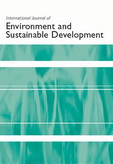
International Journal of Environment and Sustainable Development
Connecting disciplines for environmental progress.The International Journal of Environment and Sustainable Development, published by INDERSCIENCE ENTERPRISES LTD, serves as a vital platform for researchers, practitioners, and policymakers engaged in the multidisciplinary fields of geography, renewable energy, and environmental sustainability. With an ISSN of 1474-6778 and an E-ISSN of 1478-7466, this journal has been disseminating critical research since its inception in 2002 and continues to expand its scope through 2024. Recognized within the Q3 quartile in Geography, Planning and Development and Q4 in both Management, Monitoring, Policy and Law and Renewable Energy, Sustainability and the Environment, it provides valuable insights into contemporary issues affecting our planet. While access options are limited to non-open access formats, the journal remains essential for those seeking to enhance their understanding of sustainable development practices and policies in a global context. The International Journal of Environment and Sustainable Development is not only an academic repository but also a catalyst for dialogue and innovation within the environmental sciences.

ENVIRONMENTAL REVIEWS
Pioneering Research to Shape Environmental PolicyENVIRONMENTAL REVIEWS, published by Canadian Science Publishing, is a leading academic journal dedicated to the field of Environmental Science. With an impressive 2023 Q1 ranking in Environmental Science (miscellaneous) and a Scopus rank of #30 out of 233, it reflects the journal's substantial influence and contribution to the discourse on environmental issues. Launched in 1993, this journal provides a platform for critical reviews and innovative research in areas ranging from ecological sustainability to environmental policy, ensuring that it remains at the forefront of scientific inquiry. Although it currently does not offer open access, ENVIRONMENTAL REVIEWS continues to cater to a diverse readership of researchers, professionals, and students, fostering knowledge exchange essential for tackling contemporary environmental challenges. This journal not only strives to disseminate crucial findings but also aims to inspire informed decision-making and practical solutions to promote ecological welfare.
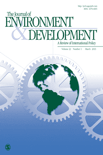
Journal of Environment & Development
Exploring the Nexus of Nature and ProgressJournal of Environment & Development is a leading scholarly journal published by SAGE Publications Inc, aimed at fostering an in-depth understanding of both environmental challenges and developmental strategies. With an ISSN of 1070-4965 and E-ISSN 1552-5465, this journal enjoys a distinguished reputation, reflected in its impressive impact factor and Q1 rankings in the fields of Development, Geography, Planning and Development, as well as its placement in the Q2 category for Management, Monitoring, Policy and Law in 2023. Since its inception in 1992, the journal has provided a vital platform for researchers, policymakers, and practitioners to share innovative ideas and impactful research findings. With SCOPUS ranking it among the top journals in its categories, the Journal of Environment & Development is essential for anyone engaged in addressing the complex interplay between environmental sustainability and human development. This journal is particularly valuable for those pursuing interdisciplinary approaches to tackle pressing societal issues. Although it is not open access, its reputable content remains crucial for those invested in these dynamic fields.
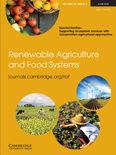
RENEWABLE AGRICULTURE AND FOOD SYSTEMS
Innovating solutions for global food security.RENEWABLE AGRICULTURE AND FOOD SYSTEMS, published by Cambridge University Press, is a leading open-access journal dedicated to the advancement of sustainability in agricultural practices and food systems. With an ISSN of 1742-1705 and an E-ISSN of 1742-1713, this journal spans the interdisciplinary fields of agronomy and food science, achieving a commendable Q2 ranking in both categories for 2023. As it continues to converge through the years from 2004 to 2024, the journal offers a platform for researchers, professionals, and students to disseminate transformative research that addresses the challenges of food security, resource management, and environmental impact. The journal’s significant impact is underscored by its Scopus rankings, situating it in the 77th percentile among agronomy and crop science publications, and the 67th percentile in food science. Since becoming fully open access in 2023, RENEWABLE AGRICULTURE AND FOOD SYSTEMS promotes wider accessibility to vital research findings, fostering collaboration and innovation in the pursuit of sustainable agricultural practices and food systems worldwide.
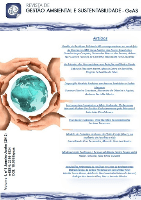
Revista de Gestao Ambiental e Sustentabilidade-GeAS
Navigating the Intersection of Geography and SustainabilityRevista de Gestao Ambiental e Sustentabilidade-GeAS, an esteemed open-access journal published by UNIV NOVE JULHO in Brazil, focuses on critical issues related to environmental management and sustainability, fostering interdisciplinary research that spans Geography, Urban Studies, and Environmental Science. With its commitment to accessibility since 2012, GeAS serves as a vital platform for researchers, professionals, and students to disseminate knowledge and innovative solutions in the realm of sustainability. Although it currently holds a Q4 ranking in Geography, Planning and Development and Management, Monitoring, Policy and Law, and Q3 in Urban Studies as of 2023, the journal aims to elevate its impact within these fields. It is uniquely positioned to contribute to the dialogue on environmental issues, policy implications, and urban development challenges in a rapidly evolving world. The journal's location in São Paulo further enriches its relevance and expertise in addressing both local and global environmental concerns.
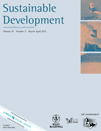
SUSTAINABLE DEVELOPMENT
Driving Innovation in Renewable SolutionsSUSTAINABLE DEVELOPMENT is a premier academic journal published by WILEY, dedicated to the dynamic fields of Development, Renewable Energy, and Sustainability. With a strong commitment to advancing knowledge, this journal holds an impressive impact factor that places it in the Q1 quartile in both the Development and Renewable Energy categories for 2023, underscoring its significant influence in the social sciences. Boasting a Scopus rank of 4th out of 306 in Development and 26th out of 270 in Renewable Energy, it reflects a high level of scholarly excellence and relevance, achieving percentiles of 98th and 90th, respectively. Established in 1993, and set to continue through 2024, the journal serves as a crucial platform for researchers, professionals, and students to share groundbreaking insights and foster interdisciplinary dialogue. Although not an open-access journal, it offers a wealth of essential research that addresses the pressing challenges of sustainable development, contributing to a more sustainable future.